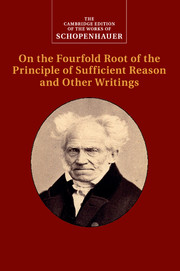Book contents
- Frontmatter
- Contents
- General Editor’s Preface
- Editorial Notes and References
- Introduction
- Notes on Text and Translation
- Chronology
- Bibliography
- Collation of the Two Editions of On the Fourfold Root
- 1 On the Fourfold Root of the Principle of Sufficient Reason
- 2 On Vision and Colours
- 3 On Will in Nature
- Glossary of Names
- Index
Seventh Chapter - On the Fourth Class of Objects for the Subject and the form of the Principle of Sufficient Reason Governing in it
Published online by Cambridge University Press: 30 June 2022
- Frontmatter
- Contents
- General Editor’s Preface
- Editorial Notes and References
- Introduction
- Notes on Text and Translation
- Chronology
- Bibliography
- Collation of the Two Editions of On the Fourfold Root
- 1 On the Fourfold Root of the Principle of Sufficient Reason
- 2 On Vision and Colours
- 3 On Will in Nature
- Glossary of Names
- Index
Summary
GENERAL EXPLANATION
The last class of objects of the faculty of representation still remaining for our consideration is one quite special, but very important: for everyone it is comprised of only one object, namely the immediate object of the inner sense, the subject of willing, which is object for the cognizing subject and indeed is given only to the inner sense; thus, it appears only in time, not in space, and even there, as we will see, with a significant qualification.
SUBJECT OF COGNITION AND OBJECT
Any cognition necessarily presupposes subject and object. Thus even selfconsciousness is not absolutely simple, but just like the consciousness of other things (i.e. the faculty of intuition), it divides into that which is cognized and that which cognizes.Here what is cognized appears absolutely and exclusively as will.
Therefore the subject cognizes itself only as something that wills, but not as something that cognizes. For the I that represents,d the subject of cognition, can never itself become a representation or object, since, as the necessary correlate of all representations, it is their condition; however, the beautiful passage of the sacred Upanishad applies to it: ‘that which sees all is not to be seen; that which hears all is not to be heard; that which knows all is not to be known; that which discerns all is not to be discerned. Beyond it, seeing, and knowing, and hearing, discerning, there is nothing.’ – Oupnek’hat, Vol. i, p. 202 –
Therefore there is no cognition of the cognizing because it would require that the subject separate itself from cognizing and yet cognize the cognizing, which is impossible.
To the objection, ‘I not only cognize, but I also knowc that I cognize’ I would answer: your knowing of your cognizing is different from your cognizing only in its being expressed. ‘I know that I cognize’, says nothing more than ‘I cognize’, and then, without anything further, this says nothing more than ‘I’. If your cognizing and your knowing of this cognizing are two different things, then try just once to have either by itself alone: first to cognize without knowing about it, and then again, to know simply of cognizing without this knowing being at the same time cognizing.
- Type
- Chapter
- Information
- Schopenhauer: On the Fourfold Root of the Principle of Sufficient Reason and Other Writings , pp. 133 - 142Publisher: Cambridge University PressPrint publication year: 2012

